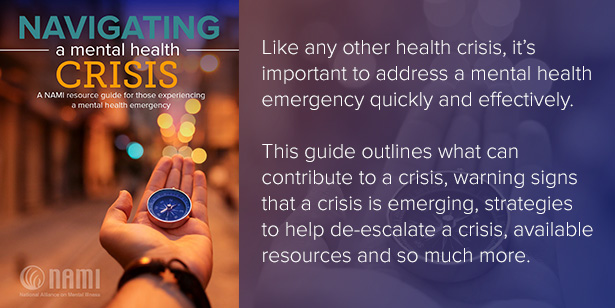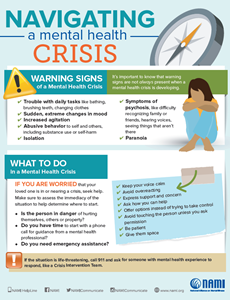

When mental illness is present, the potential for crisis is never far from mind. Crisis episodes related to mental illness can feel incredibly overwhelming. There’s the initial shock, followed by a flood of questions — the most prominent of which is: “What can we do?”
People experiencing mental illness — and the people who care for them — need information. However, that information is not always readily available and the search for answers may require more energy and persistence than possible in times of crisis.
“Navigating a Mental Health Crisis: A NAMI Resource Guide for Those Experiencing a Mental Health Emergency” (Crisis Guide) provides important, potentially life-saving information for people experiencing mental health crises and their loved ones. This guide outlines what can contribute to a crisis, warning signs that a crisis is emerging, strategies to help de-escalate a crisis, available resources and so much more.
Like any other health crisis, it’s important to address a mental health emergency quickly and effectively. With mental health conditions, crises can be difficult to predict because, often, there are no warning signs. Crises can occur even when treatment plans have been followed and mental health professionals are involved. Unfortunately, unpredictability is the nature of mental illness.
Unlike other health emergencies, people experiencing mental health crises often don’t receive instructions or materials on what to expect after the crisis. That is why we created this guide, so people experiencing mental health emergencies and their loved ones can have the answers and information they need when they need it. In the pages of our Crisis Guide, you’ll find:
We encourage sharing these tools and resources in local communities, specifically with those who are most likely to be in contact with people experiencing a mental health emergency, like:
A Portable Treatment Record from the Crisis Guide is available for download and use to begin creating your personal crisis plan.
You can also download the following infographics. They cover warning signs, what to do if you expect someone is thinking about suicide and how to prepare for a crisis. These printable resources are a great way to spread awareness about what to do in a crisis.

Warning Signs of a Mental Health Crisis // Signos de Alerta de una Crisis de Salud Mental
Warning Signs of Suicide // Signos de Alerta del Suicidio
Preparing for a Crisis // Preparación para un caso de Crisis
NAMI HelpLine is available M-F, 10 a.m. – 10 p.m. ET. Call 800-950-6264,
text “helpline” to 62640, or chat online. In a crisis, call or text 988 (24/7).